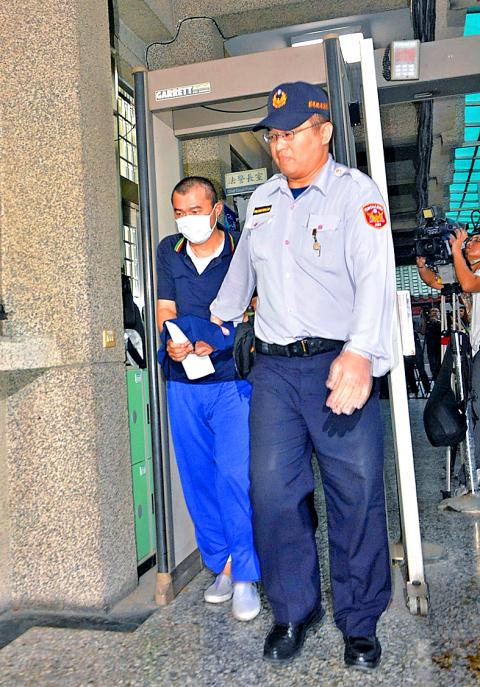The Taiwan High Prosecutors’ Office said yesterday that 17 people have been indicted in the latest cooking oil scandal, including Ting Hsin International Group (頂新集團) executive Wei Ying-chun (魏應充), for whom prosecutors have asked for a 30-year prison term.
The Changhua District Prosecutors’ Office indicted Wei on 60 counts of fraud and 79 counts of serious fraud and is seeking the maximum 30-year prison term.
Changhua County Deputy Chief Prosecutor Huang Chih-yung (黃智勇) said the investigation indicated that Wei knew his company was processing animal feed-grade material to make expensive cooking oils, although Wei still refused to admit his role in one of the nation’s worst food safety scandals on record.

Photo: CNA
The Taiwan High Prosecutors’ Office said in a statement that investigators have so far uncovered illegal profits of NT$3.83 billion (US$125.9 million) associated with the cooking oil scandal.
The coordinated judicial proceeding yesterday involved five of the nation’s district prosecutors’ offices from Taipei, Changhua County, Chiayi County, Greater Tainan and Greater Kaohsiung.
Also indicted were former Ting Hsin Oil and Fat Industrial Co (頂新製油實業) president Chang Mei-feng (常梅峰); the company’s incumbent acting chairman Chen Mao-chia (陳茂嘉); Yang Chen-yi (楊振益), who owns the Vietnamese trading company Dai Hanh Phuc Co that is accused of selling animal feed-grade materials to the edible oil maker; among others.
Chang and the others indicted are facing prison terms of between 18 and 25 years.
Of the 17 indicted, 13 suspects had already been detained. Despite requests for bail by defense lawyers after the indictment, prosecutors applied to continue their detention, citing the likelihood of collusion, destruction of evidence and the possibility that some would flee the country.
In related developments, the Taipei District Court yesterday accepted a lawsuit submitted by Chiang Shou-shan (江守山), who is suing the executives and owners of Ting Hsin International Group and its subsidiary Cheng I Food Co (正義公司) for NT$1 billion in damages.
Chiang, a resident nephrologist at Taipei’s Shin Kong Memorial hospital who also runs a health food company, said he had suffered a loss of business and a damaged reputation because the company’s pork products had been using Cheng I Food’s tainted lard oil.
Along with the lawsuit, Chiang applied with the court for a warrant against Ting Hsin International for damages, because he was outraged that up to this time the Wei brothers had paid no concern to the companies and consumers who were victims of the adulterated oil products.
According to the indictment, Ting Hsin Oil and Fat purchased from Vietnam substandard fats and oils intended for the manufacture of animal feed to save costs.
The deal was arranged by Chang, and the fats and oils were fraudulently declared for human consumption during the customs clearance procedure. Ting Hsin used the substandard materials to produce thousands of tonnes of cooking oils and sold the oils to downstream food makers all over the nation, according to investigators.
Changhua prosecutors also found evidence that Ting Hsin International had eluded paying NT$733 million in taxes between 2006 and 2012.
Additional reporting by CNA

INVESTIGATION: The case is the latest instance of a DPP figure being implicated in an espionage network accused of allegedly leaking information to Chinese intelligence Democratic Progressive Party (DPP) member Ho Jen-chieh (何仁傑) was detained and held incommunicado yesterday on suspicion of spying for China during his tenure as assistant to then-minister of foreign affairs Joseph Wu (吳釗燮). The Taipei District Prosecutors’ Office said Ho was implicated during its investigation into alleged spying activities by former Presidential Office consultant Wu Shang-yu (吳尚雨). Prosecutors said there is reason to believe Ho breached the National Security Act (國家安全法) by leaking classified Ministry of Foreign Affairs information to Chinese intelligence. Following interrogation, prosecutors petitioned the Taipei District Court to detain Ho, citing concerns over potential collusion or tampering of evidence. The

‘FORM OF PROTEST’: The German Institute Taipei said it was ‘shocked’ to see Nazi symbolism used in connection with political aims as it condemned the incident Sung Chien-liang (宋建樑), who led efforts to recall Democratic Progressive Party (DPP) Legislator Lee Kun-cheng (李坤城), was released on bail of NT$80,000 yesterday amid an outcry over a Nazi armband he wore to questioning the night before. Sung arrived at the New Taipei City District Prosecutors’ Office for questioning in a recall petition forgery case on Tuesday night wearing a red armband bearing a swastika, carrying a copy of Adolf Hitler’s Mein Kampf and giving a Nazi salute. Sung left the building at 1:15am without the armband and apparently covering the book with a coat. This is a serious international scandal and Chinese

Seventy percent of middle and elementary schools now conduct English classes entirely in English, the Ministry of Education said, as it encourages schools nationwide to adopt this practice Minister of Education (MOE) Cheng Ying-yao (鄭英耀) is scheduled to present a report on the government’s bilingual education policy to the Legislative Yuan’s Education and Culture Committee today. The report would outline strategies aimed at expanding access to education, reducing regional disparities and improving talent cultivation. Implementation of bilingual education policies has varied across local governments, occasionally drawing public criticism. For example, some schools have required teachers of non-English subjects to pass English proficiency

TRADE: The premier pledged safeguards on ‘Made in Taiwan’ labeling, anti-dumping measures and stricter export controls to strengthen its position in trade talks Products labeled “made in Taiwan” must be genuinely made in Taiwan, Premier Cho Jung-tai (卓榮泰) said yesterday, vowing to enforce strict safeguards against “origin laundering” and initiate anti-dumping investigations to prevent China dumping its products in Taiwan. Cho made the remarks in a discussion session with representatives from industries in Kaohsiung. In response to the US government’s recent announcement of “reciprocal” tariffs on its trading partners, President William Lai (賴清德) and Cho last week began a series of consultations with industry leaders nationwide to gather feedback and address concerns. Taiwanese and US officials held a videoconference on Friday evening to discuss the